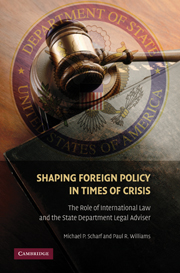 Shaping Foreign Policy in Times of Crisis
Shaping Foreign Policy in Times of Crisis Book contents
- Frontmatter
- Contents
- Acknowledgments
- Foreword: America's Conscience on International Law
- Introduction
- SHAPING FOREIGN POLICY IN TIMES OF CRISIS
- 1 The Compliance Debate
- 2 A Brief History of L
- 3 The Path to L
- 4 The Carter Administration – Herbert J. Hansell (1977–1979)
- 5 The Carter Administration – Roberts B. Owen (1979–1981)
- 6 The Reagan Administration – Davis R. Robinson (1981–1985)
- 7 The Reagan and Bush Administrations – Abraham D. Sofaer (1985–1990)
- 8 The Bush (41st) Administration – Edwin D. Williamson (1990–1993)
- 9 The Bush (41st) Administration – Michael J. Matheson
- 10 The Clinton Administration – Conrad K. Harper (1993–1996)
- 11 The Clinton Administration – David R. Andrews (1997–2000)
- 12 The Bush (43rd) Administration – William H. Taft IV (2001–2005)
- 13 The Bush (43rd) Administration – John B. Bellinger III (2005–2009)
- 14 Department of State Legal Advisers' Roundtable
- 15 Foreign Legal Advisers' Roundtable
- 16 Lawyering the Treatment of Detainees in the War on Terrorism
- 17 Conclusion
- Glossary of Terms
- Notes
- Annex: Legal Advisers of the U.S. Department of State
- Select Bibliography of Legal Scholarship by Department of State Legal Advisers
- About the Authors
- Other Books by the Authors
- Index
11 - The Clinton Administration – David R. Andrews (1997–2000)
Published online by Cambridge University Press: 05 June 2012
- Frontmatter
- Contents
- Acknowledgments
- Foreword: America's Conscience on International Law
- Introduction
- SHAPING FOREIGN POLICY IN TIMES OF CRISIS
- 1 The Compliance Debate
- 2 A Brief History of L
- 3 The Path to L
- 4 The Carter Administration – Herbert J. Hansell (1977–1979)
- 5 The Carter Administration – Roberts B. Owen (1979–1981)
- 6 The Reagan Administration – Davis R. Robinson (1981–1985)
- 7 The Reagan and Bush Administrations – Abraham D. Sofaer (1985–1990)
- 8 The Bush (41st) Administration – Edwin D. Williamson (1990–1993)
- 9 The Bush (41st) Administration – Michael J. Matheson
- 10 The Clinton Administration – Conrad K. Harper (1993–1996)
- 11 The Clinton Administration – David R. Andrews (1997–2000)
- 12 The Bush (43rd) Administration – William H. Taft IV (2001–2005)
- 13 The Bush (43rd) Administration – John B. Bellinger III (2005–2009)
- 14 Department of State Legal Advisers' Roundtable
- 15 Foreign Legal Advisers' Roundtable
- 16 Lawyering the Treatment of Detainees in the War on Terrorism
- 17 Conclusion
- Glossary of Terms
- Notes
- Annex: Legal Advisers of the U.S. Department of State
- Select Bibliography of Legal Scholarship by Department of State Legal Advisers
- About the Authors
- Other Books by the Authors
- Index
Summary
I'VE CHOSEN TO DISCUSS THE NEGOTIATIONS SURROUNDING the establishment of the Pan Am 103 trial in the Netherlands and the negotiations surrounding the accidental bombing of the Chinese Embassy during the 1999 NATO intervention in Kosovo.
Negotiations for the Pan Am 103 Trial
My first full day in office was September 15, 1997. In my first formal meeting with Secretary Albright, she asked me, “Do you think you can engineer a third-country trial for the two Libyans accused of blowing up Pan Am 103?”
She had just returned from a meeting with some of the families of the victims of Pan Am 103 and was quite moved by what she heard. The idea of a third-country trial had been circulating for quite some time, and Qaddafi, himself had suggested a trial in The Hague. The United States, for a number of reasons, was quite reluctant to take up any of these suggestions. The Attorney General, for example, was skeptical of any attempt to negotiate the venue of the trial of the two terrorists. She thought the approach could be viewed as a violation of U.S. counterterrorism policy.
However by the end of 1997, the sanctions had been in place for more than five years, and the sanctions regime was crumbling. Various countries were violating the embargo on trade, and the prohibition on flights was being violated with alarming frequency. The tenth anniversary of the bombing was coming up.
- Type
- Chapter
- Information
- Shaping Foreign Policy in Times of CrisisThe Role of International Law and the State Department Legal Adviser, pp. 113 - 126Publisher: Cambridge University PressPrint publication year: 2010


